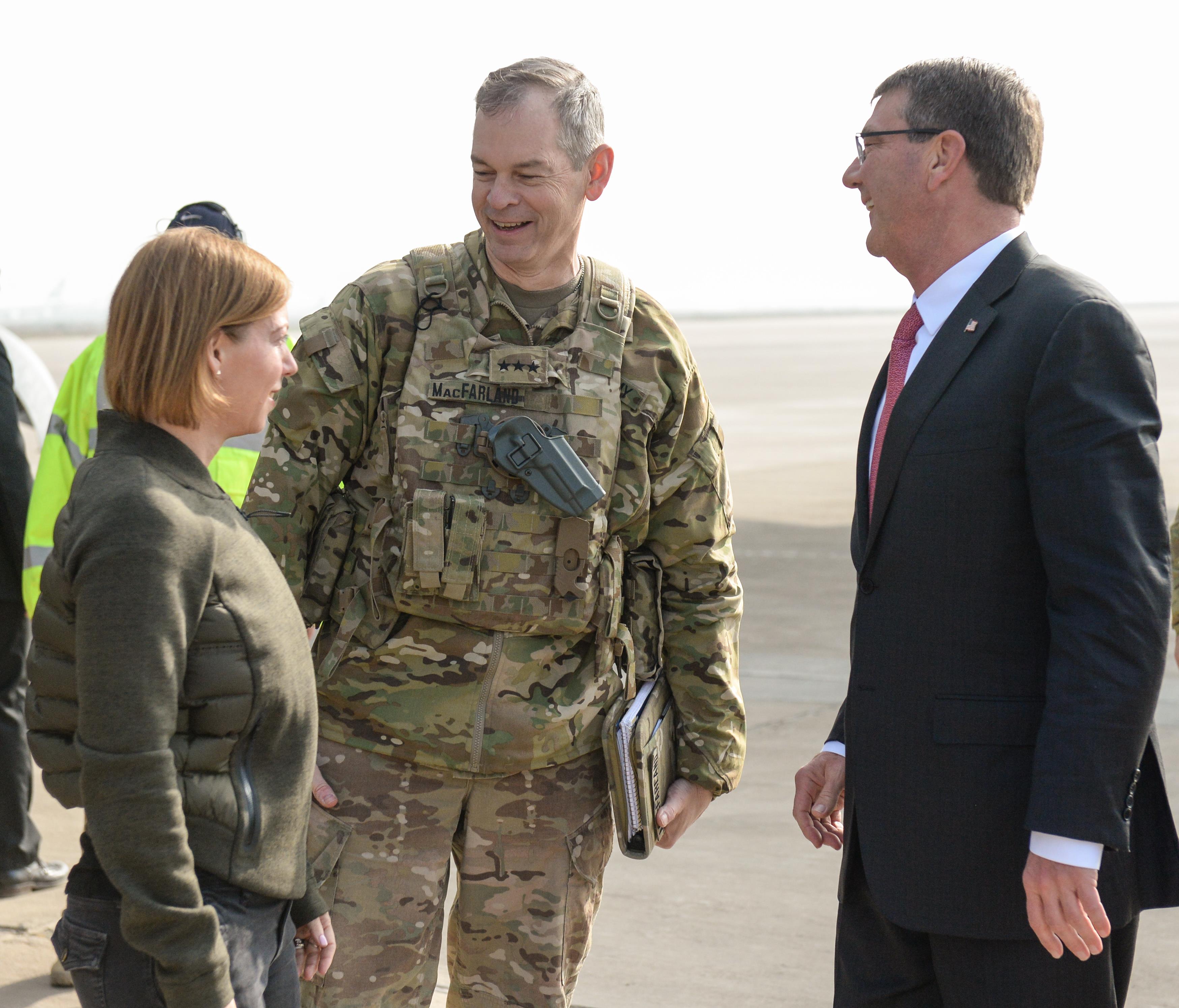| Online: | |
| Visits: | |
| Stories: |

| Story Views | |
| Now: | |
| Last Hour: | |
| Last 24 Hours: | |
| Total: | |
Inherent Resolve Commander Describes 'Significant' Progress in ISIL Fight
Thursday, December 17, 2015 13:35
% of readers think this story is Fact. Add your two cents.
By Cheryl Pellerin DoD News, Defense Media Activity
WASHINGTON, December 17, 2015 — Coalition and Iraqi forces are making important progress against the Islamic State in Iraq and the Levant in Iraq and in Syria, the commander of Combined Joint Task Force Operation Inherent Resolve said yesterday in Baghdad.
Army Lt. Gen. Sean MacFarland, speaking to reporters who are traveling in the Middle East with Defense Secretary Ash Carter, said progress is incremental but significant.
“More recently we've begun to really make some progress with our Iraqi security force partners in and around Ramadi,” MacFarland said, adding that this validates the strategy of training and equipping, advising and assisting the coalition’s ISF partners.
The enemy around Ramadi “has been attrited very significantly and we're optimistic,” the general said.
Pushing the Enemy
MacFarland added, “Although they have their own ways of doing things and it may not always be our way, it is … becoming increasingly effective as they push the enemy out of that very important city of Ramadi and begin to set the conditions to go back and take Mosul from the enemy as well.”
The coalition also is making progress in Syria with its partners in the north and through the air campaign, he said.
“We're putting pressure on the enemy throughout the breadth and depth of the battlespace,” MacFarland said, “and it's beginning to take its toll.”
The general described the two countries as a complex operational environment in which coalition partners must attend every day to political realities.
Sorting Issues
In response to a question about Iraq’s demand that Turkey remove troops and tanks that it sent two weeks ago into the Bashika military camp near Mosul, MacFarland said the coalition is in full support of Iraqi territorial sovereignty and the Turks are partners with the coalition in the fight against ISIL.
“We’re doing our best to get this issue sorted out,” he added, “but the overarching principle for us [is that] Iraq is a sovereign country, and forces should only be here if requested by the government of Iraq.”
Another question, he said, involved the U.S. offer of attack helicopters and advisors to Iraq, which according to news reports the government has declined.
In Dec. 9 testimony before the Senate Armed Services Committee about the fight against ISIL, Carter said the United States is “prepared to assist the Iraqi army with additional unique capabilities to help them finish the job [of recapturing Ramadi], including attack helicopters and accompanying advisers if circumstances dictate and if requested by Prime Minister [Haider] Abadi.”
MacFarland said yesterday in Baghdad, “Right now things are going pretty well in Ramadi so the Iraqi security forces haven't asked us to provide Apache [attack helicopter] support to them. If they were to ask, we could do that, and we're prepared to do that.”
Strategic Conversations
On the process of working with the Iraqi government on the fight against ISIL, the general characterized it as a conversation.
MacFarland described coalition members as disciples of 19th century Prussian general and military strategist Carl von Clausewitz, and the Iraqis as more like disciples of ancient Chinese general and strategist Sun Tzu.
“If anybody knows their military theories, you recognize that those two ways of war don't always align perfectly,” he added. “But we're partners so we talk it out and they adjust toward us sometimes and we adjust toward them.”
On the process of offering help to the Iraqi government, the general said coalition members closely watch how the Iraqis are doing and whether they need more enablers.
“If those enablers are required or appear to be required,” he said, “that's a conversation I have with the prime minister or the minister of defense, and then I message that back to my superiors in the United States.”
MacFarland added, “It's kind of hard to inflict support on somebody, so we try to provide support, and … the kind of support we provide has to be consistent with the way Iraqi security forces fight.”
The general gave an example involving military sustainment.
“As the Iraqis move themselves farther and farther up the Tigris and Euphrates river valleys, pushing the enemy out of Iraq, sustainment becomes more of a challenge. I mean, your lines of communication are getting longer,” he explained. “Nobody does sustainment, nobody does expeditionary operations better than the United States of America, so there are ways that we can help them with that, and we're actively looking at that.”
Source: http://terrorism-online.blogspot.com/2015/12/inherent-resolve-commander-describes.html




